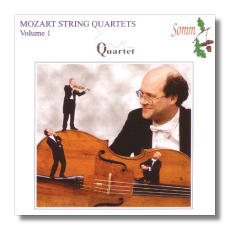
The Internet's Premier Classical Music Source
Related Links
- Mozart Reviews
- Latest Reviews
- More Reviews
-
By Composer
-
Collections
DVD & Blu-ray
Books
Concert Reviews
Articles/Interviews
Software
Audio
Search Amazon
Recommended Links
Site News
 CD Review
CD Review
Wolfgang Mozart

String Quartets, Volume 1
- Quartet in B Flat Major, K. 458 "The Hunt" (1784) [31:39]
- Quartet in C Major, K. 465 "The Dissonance" (1785) [38:33]
- Adagio & Fugue in C minor, K. 546 (1788) [7:17]
The Coull Quartet
Recorded St. Paul's Church, Birmingham, September 2003, July 2004
Somm SOMMCD040 77:44
Comparisons: The Lindsays/AS&V, Quartetto Italiano/Philips, Alban Berg String Quartet/EMI, Kocian Quartet/Denon
During the period 1782 to 1785, Mozart composed six string quartets that he dedicated to Joseph Haydn. These "Haydn" Quartets are Mozart's most popular forays into the string quartet genre, and dedicated listening tells why: perfect architecture, gorgeous melodic lines, a wide-ranging emotional content for the time period, and compelling thematic development.
For their first volume of Mozart string quartets, the Coull Quartet offers the two 'named' works in the Haydn set along with the less well-known and rather severe Adagio and Fugue in C minor.
The Coull Quartet's peformances fit into a very common classification: fine performances of frequently recorded music that are overshadowed by exceptional interpretations. In isolation, the Coull Quartet offers very satisfying interpretations highlighted by moderate to quick tempos, exuberant outer movements, an abundance of rhythmic vitality, poignant and comforting slow movements, and a superb display of Mozart's playful nature. I particularly love the sun-drenched phrasing the group conveys in the Hunt Quartet's 1st Movement and the loving security offered in the 2nd Movement Andante cantabile from the Dissonance Quartet. Also, the disc is generously filled-out with a compelling interpretation of the Adagio and Fugue in C minor that fully conveys the austerity, dotted rhythms, jagged musical lines, and baroque foundation of the work.
However, a few nagging doubts stand out when the comparison versions are considered. The Kocian Quartet gives the two works a glowing warmth that is very appealing; the Coull Quartet's readings are somewhat cool and exhibit a rather thin tone. Coolness also informs the performances of the Alban Berg String Quartet, but their outer movements have an extra degree of exuberance not found in the Coull's interpretations. Listening to the Lindsays, the wonderful expressiveness of Mozart's music fully takes shape as opposed to the Coull Quartet's partial success; although perfect intonation is not a strong suit of the Lindsays, their depth of expression has no peers.
My primary issue with the Coull Quartet's readings concerns 1st violinist Roger Coull's performances. He often displays weak projection and a wiry tone. Switch to the Quartetto Italiano's Paolo Borciani and we hear gorgeous and rich playing of strong projection and expressive detail.
And it isn't only Borciani who offers the more rewarding interpretations; each of the other three 1st violinists in the comparison versions conveys a greater breadth of emotional response and beauty of tone than Coull.
I might be a bit too hard on the performances, but I expected more from the Coull Quartet based on some wonderful recordings the group has made of the chamber music of Mendelssohn, Walton, Elgar, Bridge, and Simpson.
Of course, Mozart is an entirely different composer from an earlier era, and I do feel that the performances do not generally strike to the heart of the music except for its playful character.
Don's Conclusions: A new full-priced disc of famous Mozart string quartets needs to be rather special to compete with the host of superb alternative recordings on the market, many of them offered at less than premium price. Unfortunately, I do not detect special qualities in the Coull's Volume 1. In this case, high quality performances cloaked in an admirable and crisp soundstage do not win the day. Recommended only to dedicated fans of the Coull Quartet or those who have a strong interest in the Adagio and Fugue.
Copyright © 2006, Don Satz




















